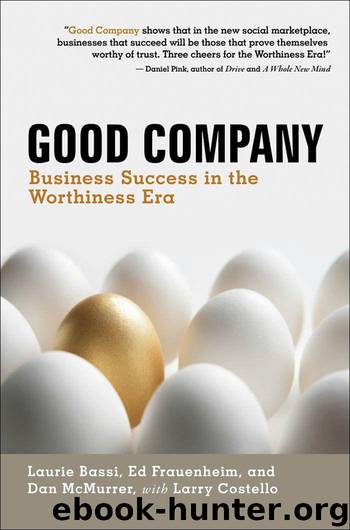Good Company: Business Success in the Worthiness Era (0) by Laurie Bassi & Ed Frauenheim & Lawrence Costello

Author:Laurie Bassi & Ed Frauenheim & Lawrence Costello [Bassi, Laurie]
Language: eng
Format: mobi
Publisher: Berrett-Koehler Publishers
Published: 2011-09-05T14:00:00+00:00
For a long time, the “for whom” question has been answered by companies in a narrow way. A “maximize shareholder value” philosophy has governed many companies over the past several decades, indicating a dominant focus on company owners (and typically top executives, who received large quantities of stock or stock options) and little concern on the part of firms for their workers or the communities they touched.
Increasingly, though, companies are expanding what we might call the people purpose to include employees as stakeholders. Whether explicitly written into company bylaws—and demonstrated through workers owning stock—or implicitly adopted as an ethos, a stakeholder mindset helps ensure that companies will treat workers with dignity and respect. Remember HCL Technologies: its Employees First initiative is both a business strategy as well as a declaration that employee welfare is central to the company.
As HCL’s strong results in recent years indicate, a broad people purpose also can spur employees to put forth their best efforts. After all, the workers know they have a serious stake in the organization’s success.
A compelling “for what” purpose also can bring out the best in employees. A cause that fires up the imagination, stirs the spirit, or otherwise taps our better nature is likely to make us work hard and feel alive on the job.
It may be a grand vision such as IBM’s goal of a “smarter planet.”22 “To fill the earth with the light and warmth of hospitality” is the mission of Hilton Worldwide. FedEx has updated its shipping services mission to include greenness as a goal—it now aims to “connect the world in responsible and resourceful ways.”23 The ambition also can be more modest.24 Former Coca-Cola CEO Roberto Goizueta used to focus on the way the company’s soft drinks helped small merchants make a living.25
The point is that it is a moving mission. This is an old, intuitive idea, one rooted in traditions such as community barn raising and cathedral building. The importance of purposeful work also has reemerged recently. A “noble cause” is critical to the highest-performing teams and organizations, according to authors Dave Logan, John King, and Halee Fischer-Wright. In their 2008 book Tribal Leadership, they estimate that less than 2 percent of workplace cultures have arrived at the ultimate, fi fth stage, including the team that produced the first Macintosh computer. Such teams or “tribes” have transcended concerns about individual achievement or even winning against other groups.26
“Their language revolves around infinite potential and how the group is going to make history—not to beat a competitor, but because doing so will make a global impact,” the authors write.27
In his 2009 book Drive, author Daniel Pink draws on a range of scholarly research to question the conventional wisdom that rewards and punishments are all you need to motivate workers.28
Companies “should move past their outdated reliance on carrots and sticks,” Pink says. “That was fine for simple, routine 20th-century tasks. But for creative, conceptual 21st-century work, companies are much better off ensuring that people have ample amounts of autonomy and that their individual efforts are hitched to a larger purpose.
Download
This site does not store any files on its server. We only index and link to content provided by other sites. Please contact the content providers to delete copyright contents if any and email us, we'll remove relevant links or contents immediately.
The Brazilian Economy since the Great Financial Crisis of 20072008 by Philip Arestis Carolina Troncoso Baltar & Daniela Magalhães Prates(133836)
International Integration of the Brazilian Economy by Elias C. Grivoyannis(110697)
The Art of Coaching by Elena Aguilar(53200)
Flexible Working by Dale Gemma;(23286)
How to Stop Living Paycheck to Paycheck by Avery Breyer(19720)
The Acquirer's Multiple: How the Billionaire Contrarians of Deep Value Beat the Market by Tobias Carlisle(12316)
Thinking, Fast and Slow by Kahneman Daniel(12267)
The Radium Girls by Kate Moore(12018)
The Art of Thinking Clearly by Rolf Dobelli(10455)
Hit Refresh by Satya Nadella(9126)
The Compound Effect by Darren Hardy(8949)
Tools of Titans by Timothy Ferriss(8369)
Atomic Habits: Tiny Changes, Remarkable Results by James Clear(8327)
Turbulence by E. J. Noyes(8040)
A Court of Wings and Ruin by Sarah J. Maas(7822)
Change Your Questions, Change Your Life by Marilee Adams(7761)
Nudge - Improving Decisions about Health, Wealth, and Happiness by Thaler Sunstein(7694)
How to Be a Bawse: A Guide to Conquering Life by Lilly Singh(7472)
Win Bigly by Scott Adams(7184)
